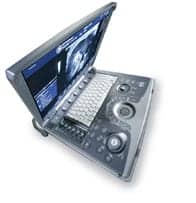|
|
Local, State, Federal |
by Elaine Sanchez
GE Launches QA Service for Ultrasound Users
FDA Rejects Ultrasound Agent Application
GE Launches QA Service for Ultrasound Users
After the RSNA meeting came to a close, GE Healthcare introduced even more offerings, adding to the bundle of solutions it already debuted at the gathering. One of these announcements was the launch of a program that aids in accreditation issues for clinical sites.

|
| GE’s new program helps facilities satisfy the part of accreditation that deals with their ultrasound systems and image quality checks. |
Specifically, the program allows sites, regardless of ultrasound vendor, to address the aspect of accreditation filing that deals with equipment and image quality. The American College of Radiology and other accrediting bodies require these imaging and system checks as part of the overall accreditation process.
According to GE, the company aims to streamline the process of maintaining image quality and system performance records—complex and time-consuming processes that traditionally burden end users.
“The government and many health care organizations are planning to start adjusting reimbursements to facilities that don’t obtain accreditation,” said Ann Marie Lubert, general manager, ultrasound services. “Our accreditation offering is a direct response to our customers’ request for such services. This program relieves biomeds and clinicians of the activities they normally had to conduct to satisfy the part of accreditation that deals with their ultrasound systems and image quality checks.”
Available under GE’s Quality Assurance Program, the new accreditation offering consists of two elements: Equipment Quality Checks and Image Quality Checks. IQCs are required to verify that image quality has not degraded from the original baseline, while ECQs confirm that the equipment is operating safely within normal parameters. Both are on-site, periodic activities.
Site representatives are given a specially designed package that permits easy access to multiple years of data and documentation, according to GE. Deliverables for customers include disks that contain proof image and paper documentation of the checks.
Existing GE Healthcare ultrasound service customers can replace standard preventive maintenance (PM) with EQCs and IQCs. These checks can also be incorporated as optional items on most new and existing contracts that do not include PMs.
Most ultrasound users who are not currently on a GE service contract can still purchase the offering.
“We’re offering the QA Program as a vendor-neutral program to accommodate most ultrasound systems,” Lubert said. “We believe that many sites would appreciate the ability to shift these accreditation-related tasks to a qualified service vendor, and we’re happy to offer it to them.”
Other services available for purchase include AcoustiCare, providing comprehensive probe coverage for sites requiring a fixed price for probe repair, and Probe Reserve, which allows customers to specify how many probe exchanges are needed annually to cover an entire inventory.
FDA Rejects Ultrasound Agent Application
Citing that possible risks outweighed the benefits, a US Food and Drug Administration advisory panel in December rejected the regulatory application of the Imagify ultrasound contrast agent from Acusphere Inc.

|
While the federal agency is not required to follow the committee’s recommendations, the panel’s advice will be considered during review of Imagify’s New Drug Application.
Voting 16-1, with one abstention, the FDA’s Cardiovascular and Renal Drugs Advisory Committee advised that the agent’s diagnostic benefit was not sufficient to justify the associated risks, which include abnormally low blood pressure and fainting spells.
“How it actually performed was disappointing in light of the risks,” panel member Tal Geva, a Harvard Medical School pediatrician, told Reuters.
The newswire reported that Acu-sphere contended its product is unique from other “microbubble” contrast agents in that its “microsphere” agent holds gas within a porous material, as opposed to a molecular shell. The company said that the side effects were manageable and that the affordable product allows clinicians to avoid radiation from alternative, more expensive tests.
However, the FDA said Imagify would likely qualify for the same cautions that its competitors are mandated to disclose.
“There are some class effects here,” said Dwaine Rieves, head of the FDA’s imaging products division.
The body also discussed issues that need to be addressed before supporting approval of the product for the detection of coronary artery disease.
The FDA had previously voiced concerns about the agent’s safety after assessing results from clinical trials. It called for warnings after receiving hundreds of reports of complications, including deaths.
As of press time, the FDA had not decided on the drug’s approval decision. The decision is expected by February 28, 2009.
Acusphere said it would work with the FDA to determine what additional information might be required for approval. The panel had recommended the company conduct larger studies that include a broader range of patients.
Last year, the FDA required black box warnings for GE Healthcare’s Optison and Lantheus Medical Imaging’s Definity, the two ultrasound contrast products on the US market.




